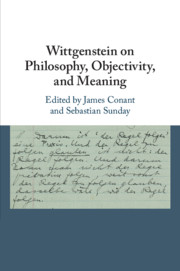Book contents
- Wittgenstein on Philosophy, Objectivity, and Meaning
- Wittgenstein on Philosophy, Objectivity, and Meaning
- Copyright page
- Contents
- Contributors
- Preface
- Acknowledgments
- Chapter 1 Anatomy of a Muddle: Wittgenstein and Philosophy
- Chapter 2 Explaining What We Mean
- Chapter 3 Objectivity
- Chapter 4 The Methodological Significance of Intuitions in Philosophy
- Chapter 5 Wittgenstein on ‘Seeing Meanings’
- Chapter 6 Bringing the Phenomenal World into View
- Chapter 7 First Steps and Conceptual Creativity
- Chapter 8 Wittgenstein and Analytic Revisionism
- Chapter 9 Demystifying Meaning in Horwich and Wittgenstein
- Chapter 10 What Is Meaning? A Wittgensteinian Answer to an Un-Wittgensteinian Question
- Chapter 11 Meaning, Use, and Supervenience
- Chapter 12 Some Socratic Aspects of Wittgenstein’s Conception of Philosophy
- References
- Index
Chapter 11 - Meaning, Use, and Supervenience
Published online by Cambridge University Press: 15 August 2019
- Wittgenstein on Philosophy, Objectivity, and Meaning
- Wittgenstein on Philosophy, Objectivity, and Meaning
- Copyright page
- Contents
- Contributors
- Preface
- Acknowledgments
- Chapter 1 Anatomy of a Muddle: Wittgenstein and Philosophy
- Chapter 2 Explaining What We Mean
- Chapter 3 Objectivity
- Chapter 4 The Methodological Significance of Intuitions in Philosophy
- Chapter 5 Wittgenstein on ‘Seeing Meanings’
- Chapter 6 Bringing the Phenomenal World into View
- Chapter 7 First Steps and Conceptual Creativity
- Chapter 8 Wittgenstein and Analytic Revisionism
- Chapter 9 Demystifying Meaning in Horwich and Wittgenstein
- Chapter 10 What Is Meaning? A Wittgensteinian Answer to an Un-Wittgensteinian Question
- Chapter 11 Meaning, Use, and Supervenience
- Chapter 12 Some Socratic Aspects of Wittgenstein’s Conception of Philosophy
- References
- Index
Summary
What is the relation between meaning and use? This chapter first defends a non-reductionist understanding of Wittgenstein’s suggestion that ‘the meaning of a word is its use in the language’; facts about meaning cannot be reduced to, or explained in terms of, facts about use, characterized non-semantically. Nonetheless, it is contended, facts about meaning do supervene on non-semantic facts about use. That supervenience thesis is suggested by comments of Wittgenstein’s and is consistent with his view of meaning and rule-following. Semantic supervenience is then defended against two criticisms: first, John McDowell’s suggestion that the supervenience thesis falsifies the epistemology of meaning and fails to accommodate common-sense truths about meaning; second, a series of counter-examples proposed by Stephen Kearns and Ofra Magidor, who argue that worlds may differ semantically without differing non-semantically. It is argued that neither criticism is convincing: we should accept the thesis that semantic facts supervene on non-semantic facts.
Keywords
- Type
- Chapter
- Information
- Wittgenstein on Philosophy, Objectivity, and Meaning , pp. 211 - 230Publisher: Cambridge University PressPrint publication year: 2019
- 1
- Cited by

